
Zagreb - The Croatian parliament on Friday passed the amendments to the Electronic Media Act and the Copyright and Related Rights Act.
The amended Electronic Media Act was adopted by 77 votes in favour and 46 against and the amended Copyright and Related Rights Act by 76 votes in favour, 46 against and one abstention. The Electronic Media Act requires a transparent declaration of ownership and financing sources. As for the problem of user comments posted under online articles, users will need to register, so that the responsibility for user comments will not rest with the publishers but with the users breaking the law.
The quota of Croatian music and audiovisual works was increased to promote the Croatian cultural identity, and a quota for works by independent producers was introduced.
Changes were also made regarding distortion of pluralism and diversity of the electronic media. If the share of one media service provider in the total annual revenues of all providers reaches 40 percent, the provider concerned will be considered as having a dominant role on the market. This provider will not be allowed to acquire new stakes or new concessions.
Audiovisual media services must not provide content inciting to violence or hatred against groups or a member of a group on grounds of gender, race, skin colour, ethnic or social origin, genetic characteristics, language, religion or conviction. They are also not allowed to incite to violence or hatred based on political or any other opinion, affiliation to an ethnic minority, property, birth, disability, age, sexual orientation or nationality, or to terrorism.
The new law ensures greater transparency in the publication of data on the ownership structure of media outlets. If the production and publication of programmes are funded by local or central government, such funding must be awarded by public tender and based on the published criteria.
The new Copyright and Related Rights Act addresses the needs of the digital society in line with the European Union's legal framework. It aims to ensure a more secure environment for cultural and creative industries so that all authors of copyrighted work can exercise their rights on the digital market, protect their work and receive a fair remuneration.